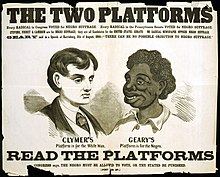Sociology of race and ethnic relations
The examples and perspective in this article deal primarily with Western culture and do not represent a worldwide view of the subject. (October 2010) |

| Part of a series on |
| Sociology |
|---|
 |
The sociology of race and ethnic relations is the study of
The sociological analysis of race and ethnicity frequently interacts with
Classical theorists
W.E.B. Du Bois

Marx
The ideas of
Booker T. Washington
Weber
Max Weber laid the foundations for a micro-sociology of ethnic relations beginning in 1906. Weber argued that biological traits could not be the basis for group foundation unless they were conceived as shared characteristics. It was this shared perception and common customs that create and distinguish one ethnicity from another. This differs from the views of many of his contemporaries who believed that an ethnic group was formed from biological similarities alone apart from social perception of membership in a group.[5]
Modern theorists
Eduardo Bonilla-Silva
Eduardo Bonilla-Silva is currently a professor of sociology at Duke University and is the 2018 president of the American Sociological Association.[6] He received his PhD in 1993 from University of Wisconsin–Madison, which is where he met his mentor, Charles Camic, of which he said "Camic believed in me and told me, just before graduation, that I should stay in the states as I would contribute greatly to American sociology." Bonilla-Silva did not start off his work as a "race scholar," but originally was trained in class analysis, political sociology, and sociology of development (globalization).[7] It was not until the late 1980s when he joined a student movement calling for racial justice at the University of Wisconsin that he began his work in race.[8] In his book, Racism without Racists, Bonilla-Silva discusses less overt racism, which he refers to as "new racism," which disguises itself "under the cloak of legality" in order to accomplish the same things. He also discusses "color-blind racism," which is essentially when people go off the basis that we have achieved equality and deny past and present discriminations.[9]
Patricia Hill Collins
Patricia Hill Collins is currently a Distinguished University Professor Emerita at the University of Maryland, College Park. She received her PhD in sociology in 1984 from Brandeis University. Collins was the president-elect for the American Sociological Association, where she was the 100th president and the first African-American woman to be president of the organization. Collins is a social theorist whose work and research primarily focuses on race, social class, sexuality, and gender. She has written a number of books and articles on said topics.[10] Collins work focuses on Intersectionality, by looking at issues through the lens of women of color. In her work, she writes "First, we need new visions of what oppression is, new categories of analysis that are inclusive of race, class, and gender as distinctive yet interlocking structures of oppression".[11]
Denise Ferreira da Silva
Denise Ferreira da Silva is a trained sociologist and critical philosopher of race. She is a professor and director of The Social Justice Institute (the Institute for Gender, Race, Sexuality, and Social Justice) at the University of British Columbia. Before joining UBC, she was an associate professor of ethnic studies, at the University of California, San Diego. Da Silva's major monograph, Toward a Global Idea of Race, traces the history of modern philosophical thought from Descartes to Herder in order to reconstruct the emergence of the racial as an historical and scientific concept. This sociology of race relations for Da Silva locates the mind as the principle site of the development of the racial and cultural which emerge as the global (exterior-spatial) in the contemporary context.[12]
Discipline development by country
United States
In the
United Kingdom
In the
As with the UK establishments of media and cultural studies, 'ethnic relations' is often taught as a loosely distinct discipline either within sociology departments or other schools of humanities.
Major British theorists include Paul Gilroy, Stuart Hall, Richard Jenkins, John Rex, Michael Banton and Tariq Modood.
Social psychology

One of the most important social psychological findings concerning race relations is that members of stereotyped groups internalize those stereotypes and thus suffer a wide range of harmful consequences. For example, in a phenomenon called
Audit studies
Another important line of research on race takes the form of
See also
References
- ^ Du Bois, W.E.B. 1940. Dusk of dawn; an essay toward an autobiography of a race concept. Schocken Books.
- ^ Hynes, Gerald. ????. A Biographical Sketch of W.E.B. Du Bois Archived 2019-05-10 at the Wayback Machine. W.E.B. Du Bois Learning Center.
- ^ Bohmer, Peter. 1998. Marxist Theory of Racism and Racial Inequality. Readings in Black Political Economy
- ^ Harlen, Louis. 1972. Booker T. Washington. University of North Carolina Press.
- ^ Banton, Michael. 2008. The Sociology of Ethnic Relations. Ethnic and Racial Studies.
- ^ "Leadership". American Sociological Association. 2009-05-23. Archived from the original on 2019-05-19. Retrieved 2018-11-05.
- ^ "Eduardo Bonilla-Silva | Duke Sociology". sociology.duke.edu. Archived from the original on 2019-11-04. Retrieved 2018-11-05.
- ^ "Introducing Eduardo Bonilla-Silva, 2018 ASA President". American Sociological Association. 2017-10-29. Retrieved 2018-11-05.
- )
- ^ "Patricia Hill Collins | SOCY l Sociology Department l University of Maryland". socy.umd.edu. Archived from the original on 2017-05-16. Retrieved 2018-11-05.
- JSTOR 41680038.
- OCLC 247457439.
- ^ Park, Robert Ezra. 1950. The Early Sociology of Race and Ethnicity. The Free Press.
- S2CID 142233949.
- ^ "What is stereotype threat?" http://www.reducingstereotypethreat.org/definition.html Archived 2008-04-03 at the Wayback Machine
- ^ Steele & Aronson. 1995. Stereotype threat and the intellectual test performance of African Americans. Journal of Personality and Social Psychology.
- ^ Lovaglia, Michael, JW Lucas, SR Thye. 1998. Status Processes and Mental Ability Test Scores. American Journal of Sociology.
- S2CID 11568703.
- .
Further reading
- Banton, M. 1987. Racial Theories. Cambridge: Cambridge University Press.
- Ellis, J. 2011. Race Relations | Culture and Ethnicity. USARiseUp
- Feagin, J. 2003. Racial and Ethnic Relations. Prentice Hall (8th edition)
- Gibson, Robert. 1978. Booker T. Washington and W. E. B. DuBois: The Problem of Negro Leadership. Yale
- Jenkins, R. 2008. Rethinking Ethnicity. London: Sage (2nd edition).
- Malesevic, S. 2004. The Sociology of Ethnicity. London: Sage.
- Omi, M. & Winant, H. 1986. Racial Formation in the United States. New York: Routledge
- Thomas, C. 2022. The Racialized Consequences of Jail Incarceration on Local Labor Markets, Race and Justice.
- Vera, H; Feagin, J. 2007. Handbook of the Sociology of Racial and Ethnic Relations. Springer
- Wilson, H. 2006. The Sociology of Racial and Ethnic Relations. Bryant
- Zuckermann, Ghil'ad et al. (2015), ENGAGING - A Guide to Interacting Respectfully and Reciprocally with Aboriginal and Torres Strait Islander People, and their Arts Practices and Intellectual Property, Australian Government: Indigenous Culture Support.
